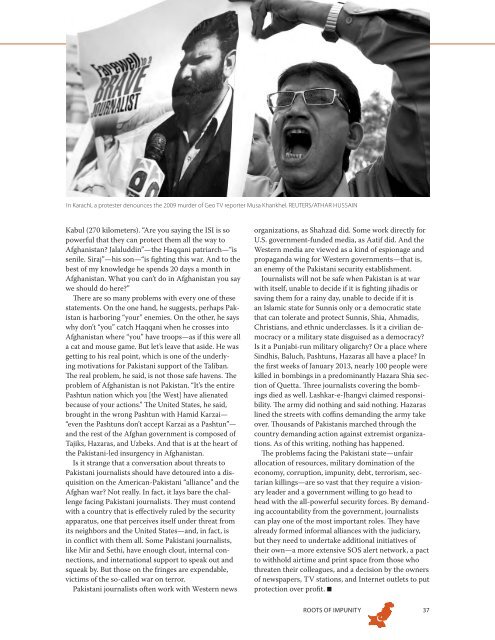CPJ.Pakistan.Roots.of.Impunity
CPJ.Pakistan.Roots.of.Impunity
CPJ.Pakistan.Roots.of.Impunity
Create successful ePaper yourself
Turn your PDF publications into a flip-book with our unique Google optimized e-Paper software.
In Karachi, a protester denounces the 2009 murder <strong>of</strong> Geo TV reporter Musa Khankhel. REUTERS/ATHAR HUSSAIN<br />
Kabul (270 kilometers). “Are you saying the ISI is so<br />
powerful that they can protect them all the way to<br />
Afghanistan? Jalaluddin”—the Haqqani patriarch—“is<br />
senile. Siraj”—his son—“is fighting this war. And to the<br />
best <strong>of</strong> my knowledge he spends 20 days a month in<br />
Afghanistan. What you can’t do in Afghanistan you say<br />
we should do here?”<br />
There are so many problems with every one <strong>of</strong> these<br />
statements. On the one hand, he suggests, perhaps <strong>Pakistan</strong><br />
is harboring “your” enemies. On the other, he says<br />
why don’t “you” catch Haqqani when he crosses into<br />
Afghanistan where “you” have troops—as if this were all<br />
a cat and mouse game. But let’s leave that aside. He was<br />
getting to his real point, which is one <strong>of</strong> the underlying<br />
motivations for <strong>Pakistan</strong>i support <strong>of</strong> the Taliban.<br />
The real problem, he said, is not those safe havens. The<br />
problem <strong>of</strong> Afghanistan is not <strong>Pakistan</strong>. “It’s the entire<br />
Pashtun nation which you [the West] have alienated<br />
because <strong>of</strong> your actions.” The United States, he said,<br />
brought in the wrong Pashtun with Hamid Karzai—<br />
“even the Pashtuns don’t accept Karzai as a Pashtun”—<br />
and the rest <strong>of</strong> the Afghan government is composed <strong>of</strong><br />
Tajiks, Hazaras, and Uzbeks. And that is at the heart <strong>of</strong><br />
the <strong>Pakistan</strong>i-led insurgency in Afghanistan.<br />
Is it strange that a conversation about threats to<br />
<strong>Pakistan</strong>i journalists should have detoured into a disquisition<br />
on the American-<strong>Pakistan</strong>i “alliance” and the<br />
Afghan war? Not really. In fact, it lays bare the challenge<br />
facing <strong>Pakistan</strong>i journalists. They must contend<br />
with a country that is effectively ruled by the security<br />
apparatus, one that perceives itself under threat from<br />
its neighbors and the United States—and, in fact, is<br />
in conflict with them all. Some <strong>Pakistan</strong>i journalists,<br />
like Mir and Sethi, have enough clout, internal connections,<br />
and international support to speak out and<br />
squeak by. But those on the fringes are expendable,<br />
victims <strong>of</strong> the so-called war on terror.<br />
<strong>Pakistan</strong>i journalists <strong>of</strong>ten work with Western news<br />
organizations, as Shahzad did. Some work directly for<br />
U.S. government-funded media, as Aatif did. And the<br />
Western media are viewed as a kind <strong>of</strong> espionage and<br />
propaganda wing for Western governments—that is,<br />
an enemy <strong>of</strong> the <strong>Pakistan</strong>i security establishment.<br />
Journalists will not be safe when <strong>Pakistan</strong> is at war<br />
with itself, unable to decide if it is fighting jihadis or<br />
saving them for a rainy day, unable to decide if it is<br />
an Islamic state for Sunnis only or a democratic state<br />
that can tolerate and protect Sunnis, Shia, Ahmadis,<br />
Christians, and ethnic underclasses. Is it a civilian democracy<br />
or a military state disguised as a democracy?<br />
Is it a Punjabi-run military oligarchy? Or a place where<br />
Sindhis, Baluch, Pashtuns, Hazaras all have a place? In<br />
the first weeks <strong>of</strong> January 2013, nearly 100 people were<br />
killed in bombings in a predominantly Hazara Shia section<br />
<strong>of</strong> Quetta. Three journalists covering the bombings<br />
died as well. Lashkar-e-Jhangvi claimed responsibility.<br />
The army did nothing and said nothing. Hazaras<br />
lined the streets with c<strong>of</strong>fins demanding the army take<br />
over. Thousands <strong>of</strong> <strong>Pakistan</strong>is marched through the<br />
country demanding action against extremist organizations.<br />
As <strong>of</strong> this writing, nothing has happened.<br />
The problems facing the <strong>Pakistan</strong>i state—unfair<br />
allocation <strong>of</strong> resources, military domination <strong>of</strong> the<br />
economy, corruption, impunity, debt, terrorism, sectarian<br />
killings—are so vast that they require a visionary<br />
leader and a government willing to go head to<br />
head with the all-powerful security forces. By demanding<br />
accountability from the government, journalists<br />
can play one <strong>of</strong> the most important roles. They have<br />
already formed informal alliances with the judiciary,<br />
but they need to undertake additional initiatives <strong>of</strong><br />
their own—a more extensive SOS alert network, a pact<br />
to withhold airtime and print space from those who<br />
threaten their colleagues, and a decision by the owners<br />
<strong>of</strong> newspapers, TV stations, and Internet outlets to put<br />
protection over pr<strong>of</strong>it. n<br />
ROOTS OF IMPUNITY 37


